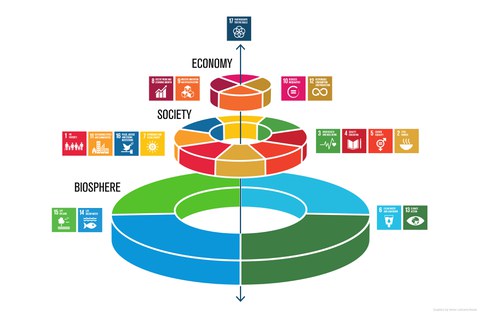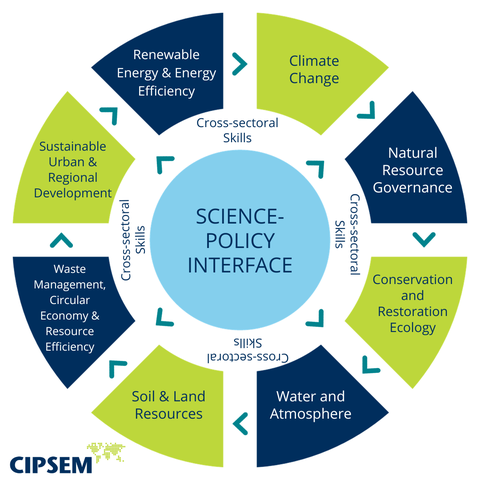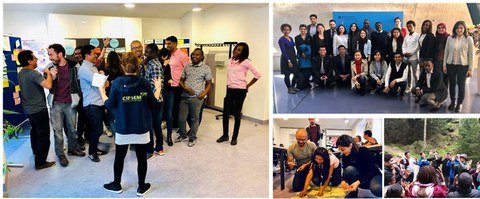47th UNEP/UNESCO/BMUV International Postgraduate Course on Environmental Management for Developing Countries (EM47)
Dauer: 11. Januar 2024 - 12. Juli 2024 (vor Ort in Dresden)
Motivation
Die Ziele für nachhaltige Entwicklung (Sustainable Development Goals, SDGs) waren ein bemerkenswerter Fortschritt, als sie 2015 von den Vereinten Nationen verabschiedet wurden. Zum ersten Mal verpflichtete sich die Welt auf ein breites Spektrum gemeinsamer Ziele, die von Klimaschutz bis zu nachhaltigem Wirtschaftswachstum, von Leben unter Wasser bis zu nachhaltigen Städten, von der Beendigung von Hunger und Armut bis zu verantwortungsvollem Konsum und verantwortungsvoller Produktion und von der Verringerung von Ungleichheiten bis zu inklusiver Industrialisierung reichen. Die Agenda 2030 ist ein klares Bekenntnis dazu, dass der Erhalt unserer Biosphäre von der nachhaltigen Bewirtschaftung des Planeten Erde abhängt.

Biosphere foundation for global sustainability (Source: Rockström and Sukhdev 2016, Azote Images for Stockholm Resilience Centre)
Kurskonzept und Ziele
Weltweit hinkt die Umsetzung der Ziele für nachhaltige Entwicklung (SDGs) und des Pariser Klimaabkommens weit hinter den ehrgeizigen Zielen her. Zur Unterstützung beider Abkommen verfolgt der 6-monatige UNEP/UNESCO/BMUV-Kurs einen integrierten und interdisziplinären Ansatz im Einklang mit den SDGs und dem Pariser Abkommen und deckt zentrale Aspekte der Nachhaltigkeit und des Umweltmanagements ab.
Der Lehrplan ist in mehrere Module gegliedert, die folgende Bereiche umfassen: Erhaltung und Wiederherstellung der Ökologie, Wasser und Atmosphäre, Boden- und Landressourcen, nachhaltige Stadt- und Regionalentwicklung, Abfallwirtschaft und Kreislaufwirtschaft, erneuerbare Energien und Energieeffizienz. Eine übergreifende Schnittstelle zwischen Wissenschaft und Politik bildet den Rahmen für alle Disziplinen.

Modularer Aufbau der Kursinhalte des UNEP/UNESCO/BMUV International Postgraduate Course on Environmental Management for Developing Countries
Darüber hinaus werden alle Teilnehmenden grundlegende Fähigkeiten mit sektorübergreifender Relevanz trainieren, wie z. B. Politikberatung, Präsentationsfähigkeiten, Projektplanung und -management, die im Kontext ihrer lokalen Gegebenheiten angewandt werden können, sowie Kommunikation über Disziplinen und Kulturen hinweg, partizipative Regierungspraktiken und Verständnis von Geoinformationen.
Das CIPSEM verfolgt einen integrativen und interdisziplinären Lehransatz, der nicht nur Wissen über globale Umweltprozesse und Methoden für ein nachhaltiges Ressourcenmanagement vermittelt, sondern auch Fähigkeiten zum ganzheitlichen Denken in Bezug auf umweltrelevante Themen und entsprechende Lösungen fördert. Der Gesamtansatz besteht darin, akademisches Wissen mit lokalem, traditionellem und professionellem Fachwissen zu verbinden.
Die Vorlesungen werden von Hochschullehrenden der Technischen Universität Dresden und Fachleuten aus verschiedenen nationalen und internationalen Institutionen gehalten, auch in Zusammenarbeit mit CIPSEM-Alumni. Die Teilnehmenden sind verpflichtet, ein Forschungsprojekt mit wissenschaftlichem Anspruch zu einem bestimmten umweltbezogenen Thema durchzuführen und die Ergebnisse dieser Arbeit am Ende des Kurses in einem Symposium zu präsentieren.
Nach dem Besuch des Kurses sind die Teilnehmenden in der Lage, multidisziplinäre und interdisziplinäre Maßnahmen und Strategien für eine nachhaltige Entwicklung zu entwickeln und diese unter Berücksichtigung ökologischer, sozioökonomischer, politischer und kultureller Aspekte für den Umweltschutz und das Umweltmanagement adäquat umzusetzen.
Zielgruppen
Der Kurs richtet sich insbesondere an Fach- und Führungskräfte der öffentlichen Verwaltung auf nationaler, regionaler und lokaler Ebene, die eine umfassende Kompetenz in Umweltfragen benötigen. Aber auch Fachleute aus Wissenschaft, Wirtschaft oder Zivilgesellschaft, die in ihren Ländern bereits Verantwortung für die nachhaltige Entwicklung tragen, können sich bewerben. Um in Frage zu kommen, müssen die Bewerbenden aus Entwicklungsländern, einschließlich Schwellenländern, stammen und in diesen arbeiten. Die Bewerbenden müssen außerdem über eine mehrjährige Berufspraxis im Bereich des Kurses verfügen, um einen für beide Seiten nützlichen Erfahrungsaustausch zu ermöglichen. Ein erster Hochschulabschluss (z. B. BA, BSc), ausreichende Kommunikationsfähigkeiten in englischer Sprache und die Nominierung durch die entsendende Einrichtung sind zwingend erforderlich.

Eindrücke von vergangenen Umweltmanagement-Kursen
Bewerbung und Teilnahme
Qualifizierte Fachleute können sich vom 29. März 2023 bis zum 15. Mai 2023 über das Online-Bewerbungsportal von CIPSEM für diesen Kurs bewerben. Das Steuerungsgremium wählt bis Anfang August 2023 21 Teilnehmende für diesen Kurs aus. Nur die ausgewählten Teilnehmenden werden per E-Mail benachrichtigt.
Die Teilnehmenden wohnen in unseren komfortablen Einzelapartments und erhalten ein Stipendium zur Deckung der grundlegenden Lebenshaltungskosten (550 €/Monat). Darüber hinaus werden Flüge, Krankenversicherung, Fahrkarten für öffentliche Verkehrsmittel, Kosten für Übernachtungen bei Ausflügen usw. übernommen. Das Kursbüro wird Ihnen zusätzlich vielfältige Unterstützung bieten.
Teilnehmende, die diesen Kurs erfolgreich abschließen, erhalten ein Postgraduate Diploma in Environmental Management.
| Name (A-Z) | Institution |
|---|---|
| Ahrens, Dominic | TU Dresden, Institut für Internationale Holz- und Forstwirtschaft, Professur für Tropische und Internationale Forstwirtschaft |
| Astutik, Sri | TU Dresden, Institut für Internationale Holz- und Forstwirtschaft, Professur für Tropische und Internationale Forstwirtschaft |
| Dr. Becker, Thilo | Stadt Trier, Baudezernent |
| Prof. Dr. Becker, Udo | TU Dresden, Institut für Verkehrsplanung und Straßenverkehr, Seniorpofessur für Verkehrsökologie |
| Benedikter, Simon | TU Dresden, Institut für Internationale Holz- und Forstwirtschaft, Professur für Tropische und Internationale Forstwirtschaft |
| Prof. Dr. Berger, Uta | TU Dresden, Institut für Waldwachstum und Forstliche Informatik, Professur für Forstliche Biometrie und Systemanalyse |
| Dr. Brämick, Uwe | Institut für Binnenfischerei e. V. Potsdam-Sacrow |
| Caser, Ursula | Universität Hamburg; Mediatedomain Lda |
| Dr. Caucci, Serena | United Nations University, Institute for Integrated Management of Material Fluxes and of Resources (UNU-FLORES) |
| Charmakar, Shambhu | TU Dresden, Institut für Internationale Holz- und Forstwirtschaft, Professur für Tropische und Internationale Forstwirtschaft |
| Dr. Claußnitzer, Viola | Senckenberg Museum für Naturkunde Görlitz |
| Dr. Dittrich, Sebastian | TU Dresden, Institut für Allgemeine Ökologie und Umweltschutz, Professur für Biodiversität und Naturschutz |
| Prof. Dr. Dornack, Christina | TU Dresden, Institut für Abfall- und Kreislaufwirtschaft, Professur für Abfall- und Kreislaufwirtschaft |
| Dziumla, Juliane | United Nations University, Institute for Integrated Management of Material Fluxes and of Resources (UNU-FLORES) |
| Dr. Egermann, Markus | Leibniz-Institut für ökologische Raumentwicklung (IÖR), Dresden, Forschungsbereich Transformative Kapazitäten |
| Prof. Dr. Feger, Karl-Heinz | TU Dresden, Institut für Bodenkunde und Standortslehre, Professor für Standortslehre und Pflanzenernährung |
| Fernando, Shanali | United Nations University, Institute for Integrated Management of Material Fluxes and of Resources (UNU-FLORES) |
| Dr. Fischer, Axel | TU Dresden, Institut für Abfall- und Kreislaufwirtschaft, Professur für Abfall- und Kreislaufwirtschaft |
| JProf. Dr. Forkel, Matthias | TU Dresden, Institut für Photogrammetrie und Fernerkundung, Juniorprofessur für Umweltfernerkundung |
| Prof. Dr. Francke, Angela | Universität Kassel, Institut für Verkehrswesen, Professur für Radverkehr und Nahmobilität |
| Fröhlich, Sven | TU Dresden, Institut für Verkehrstelematik, Professur für Verkehrsprozessautomatisierung |
| Fuchs, Gregory | Ecologic Institute |
| Dr. Gallo, Patrícia | TU Dresden, Fakultät Umweltwissenschaften, Centre for International Postgraduate Studies of Environmental Management (CIPSEM) |
| Gerking, Leonie | TU Dresden, Institut für Abfall- und Kreislaufwirtschaft, Professur für Abfall- und Kreislaufwirtschaft |
| Prof. Dr. Giessen, Lukas | TU Dresden, Institut für Internationale Holz- und Forstwirtschaft, Professur für Tropische und Internationale Forstwirtschaft |
| Dr. Githumbi, Esther | TU Dresden, Institut für Bodenkunde und Standortslehre |
| Dr. Görner, Anna | TU Dresden, Fakultät Umweltwissenschaften, Centre for International Postgraduate Studies of Environmental Management (CIPSEM) |
| Gürtler, Petra | Freiberufliche Stadtführerin |
| Prof. Dr. Günther, Edeltraud | United Nations University, Institute for Integrated Management of Material Fluxes and of Resources (UNU-FLORES) |
| Prof. Dr. Hartmann, Andreas | TU Dresden, Institut für Grundwasserwirtschaft, Professur Grundwassersysteme |
| Hansen, Jennifer | Donut Berlin |
| Heidegger, Fabian | TU Dresden, Institut für Verkehrsplanung und Straßenverkehr, Professur für Mobilitätssystemplanung |
| Hintz, Kendisha Soekardjo | TU Dresden, Institut für Internationale Holz- und Forstwirtschaft, Professur für Tropische und Internationale Forstwirtschaft |
| Huidobro, Gabriela | TU Dresden, Institut für Internationale Forst- und Holzwirtschaft, Professur für Tropische und Internationale Forstwirtschaft |
| Ibrahim, Ishmaila | TU Dresden, Institut für Internationale Forst- und Holzwirtschaft, Professur für Tropische und Internationale Forstwirtschaft |
| Dr. Inostroza, Luis | Mendel University in Brno, Department of Environmentalistics and Natural Resources |
| Dr. Jost, François | European Citizen Science Association (ECSA) |
| Prof. Dr. Kalbitz, Karsten | TU Dresden, Institut für Bodenkunde und Standortslehre, Professur für Bodenressourcen und Landnutzung |
| Dr. Kamamia, Ann | TU Dresden, Institut für Bodenkunde und Standortslehre |
| Prof. Dr. Karthe, Daniel | United Nations University, Institute for Integrated Management of Material Fluxes and of Resources (UNU-FLORES) |
| Dr. Kasymov, Ulan | TU Dresden, Internationales Hochschulinstitut (IHI) Zittau, Professur für Ökosystemare Dienstleistungen |
| Prof. Dr. Kimaro, Didas | Mwenge Catholic University (MWECAU) |
| Kimaro, Oforo | TU Dresden, Institut für Bodenkunde und Standortslehre |
| Prof. Dr. Krebs, Peter | TU Dresden, Institut für Siedlungs- und Industriewasserwirtschaft, Professur für Siedlungswasserwirtschaft |
| Kugler, Lucas | TU Dresden, Institut für Photogrammetrie und Fernerkundung, Juniorprofessur für Umweltfernerkundung |
| Kupilas, Benjamin | Ecologic Institute |
| Dr. Kußerow, Hannelore | Freie Universität Berlin, Institut für Geographische Wissenschaften, Fernerkundung und Geoinformatik |
| Dr. Lindner, André | TU Dresden, Bereich Bau und Umwelt; Fakultät Umweltwissenschaften, Centre for International Postgraduate Studies of Environmental Management (CIPSEM) |
| Loghmani, Taha | United Nations University, Institute for Integrated Management of Material Fluxes and of Resources (UNU-FLORES) |
| Dr. Lohmann, Dietmar | Haus der Kongresse für Umwelt - Bau - Verkehr Dresden e. V. |
| Lorenz, Ullrich | Systemic Futures |
| Makwinja, Yamikani | United Nations University, Institute for Integrated Management of Material Fluxes and of Resources (UNU-FLORES); CIPSEM Alumnus |
| Dr. Maletz, Roman | TU Dresden, Institut für Abfall- und Kreislaufwirtschaft, Professur für Abfall- und Kreislaufwirtschaft |
| Martinelli, Fernanda | Center for Development Research (ZEF), Department of Ecology and Natural Resources Management |
| Menon, Urvana | World Wide Fund for Nature (WWF) Myanmar |
| Dr. Micheletti, Tatiane | TU Dresden, Institut für Waldwachstum und Forstliche Informatik, Professur für Forstliche Biometrie und Systemanalyse |
| Moreno, Sandra | Cambio e.V. |
| Prof. Dr. Dr. h.c. Müller, Bernhard | TU Dresden, Fakultät Umweltwissenschaften, Seniorprofessur Prof. Dr. Dr. h.c. Bernhard Müller |
| Müller, Juliane | Cambio e.V. |
| Naik, Netra | TU Dresden, Fakultät Umweltwissenschaften, Centre for International Postgraduate Studies of Environmental Management (CIPSEM) |
| Owusu, Raphael | TU Dresden, Institut für Internationale Holz- und Forstwirtschaft, Professur für Tropische und Internationale Forstwirtschaft |
| Dr. Pietzarka, Ulrich | TU Dresden, Institut für Forstbotanik und Forstzoologie, Professur für Forstbotanik |
| Polo, Fredy David | TU Dresden, Institut für Internationale Holz- und Forstwirtschaft, Professur für Tropische und Internationale Forstwirtschaft |
| Prof. Dr. Ring, Irene | TU Dresden, Internationales Hochschulinstitut (IHI) Zittau, Professur für Ökosystemare Dienstleistungen |
| Dr. Rode, Julian | Helmholtz-Zentrum für Umweltforschung GmbH – UFZ Leipzig, Abteilung Umweltpolitik |
| Rodríguez, Sara Paola |
SWIM - Solutions for Water Integrity and Management |
| Rößler, Stefanie | Leibniz-Institut für ökologische Raumentwicklung (IÖR), Dresden |
| Rückert, André | ECOLOGICON GmbH |
| Dr. Schad, Peter | TU München, School of Life Sciences, Lehrstuhl für Bodenkunde |
| Prof. Dr. Schanze, Jochen | TU Dresden, Fakultät Umweltwissenschaften, Professur für Umweltentwicklung und Risikomanagement; Leibniz-Institut für ökologische Raumentwicklung (IÖR), Dresden, Wissensintegrationshub |
| Dr. Schiappacasse, Paulina | TU Dresden, Fakultät Umweltwissenschaften, Seniorprofessur Prof. Dr. Dr. h.c. Bernhard Müller |
| Schmachtel, Dominique | TU Dresden, Fakultät Umweltwissenschaften, Centre for International Postgraduate Studies of Environmental Management (CIPSEM) |
| Dr. Schusser, Carsten | TU Dresden, Institut für Internationale Holz- und Forstwirtschaft, Professur für Tropische und Internationale Forstwirtschaft |
| Schwan, Benjamin | TU Dresden, Institut für Abfall- und Kreislaufwirtschaft, Professur für Abfall- und Kreislaufwirtschaft |
| Shehayeb, Raghid | TU Dresden, Fakultät Umweltwissenschaften; Leibniz-Institut für ökologische Raumentwicklung (IÖR), Dresden, Dresden Leibniz Graduate School |
| Dr. Stein, Katharina | Universität Potsdam, Institut für Biochemie und Biologie, Professur für Biodiversitätsforschung/Systematische Botanik |
| Stölzel, Franziska | United Nations University, Institute for Integrated Management of Material Fluxes and of Resources (UNU-FLORES) |
| Tavares, Ana Alice de Oliveira | TU Dresden, Institut für Internationale Holz- und Forstwirtschaft, Professur für Tropische und Internationale Forstwirtschaft |
| Dr. Tingwey, Emilienne | The Renewables Academy AG - RENAC |
| Dr. Vidal, Mariana | PlanAdapt Berlin; BluoVerda Deutschland e.V. |
| Prof. Dr. von Oheimb, Goddert | TU Dresden, Institut für Allgemeine Ökologie und Umweltschutz, Professur für Biodiversität und Naturschutz |
| Prof. Dr. Wende, Wolfgang | Leibniz-Institut für ökologische Raumentwicklung (IÖR), Dresden, Forschungsbereich Landschaft, Ökosysteme und Biodiversität; TU Dresden, Institut für Städtebau und Regionalplanung, Professur für Siedlungsentwicklung |
| Zenker, Armin | Saxony State Foundation for Nature and the Environment |
| Zinder, Georg | Leibniz-Institut für ökologische Raumentwicklung (IÖR), Dresden |

